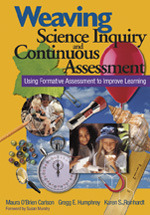Weaving Science Inquiry and Continuous Assessment
Using Formative Assessment to Improve Learning
Foreword by Susan Mundry
"The authors provide a rationale and practical tools for weaving continuous assessment and instruction in science into the fabric of learning. Teachers who use the methods in the book will know what and how students are learning every day and gain insights into how to best facilitate learning in their classrooms."
—From the Foreword by Susan Mundry
Experience the delight and professional growth that comes from engaging deeply with your students!
By combining science inquiry and continuous assessment, you will not only catalyze meaningful changes in your students' thinking and learning but also reflect on and enhance your own approach to teaching. Inquiry science is a standards-based teaching method whereby students ask questions and find answers for themselves using scientific methods under the guidance of a teacher. Continuous assessment is a purposeful approach to listening and observing students and using that information to understand a student's thinking and skills. Formulating strategies and plans to support each student's intellectual growth is the next step in this circular process.
Weaving Science Inquiry & Continuous Assessment explores the nature of continuous assessment in the context of science inquiry, and contains specific tools and techniques, along with stories and strategies in teachers' own words. Chapters cover the following subjects that reflect the latest information and most current teaching environment:
- The essence of continuous assessment
- The context for continuous assessment
- Techniques and tools for facilitating inquiry and collecting student data
- Analyzing and using continuous assessment data
- Challenges, realities, and advice
- Continuous assessment and professional growth
By engaging in this process of inquiry and continuous assessment, both students and teachers will benefit from this fresh approach to learning, thinking, and assessment.
The authors provide a rationale and practical tools for weaving continuous assessment and instruction in science into the fabric of learning. Teachers who use the methods in the book will know what and how students are learning every day and gain insights into how to best facilitate learning in their classrooms.
Assessing what students know and are able to do is a major component of standards-based education and is one of the hottest topics on the educational scene. This book addresses assessment in a unique way and provides an excellent opportunity for readers to view and understand formative assessment as equal to summative assessment.
This wonderful 'how-to' book offers new approaches for assessing inquiry-based teaching and learning. This book is a must for the science educator’s library.
